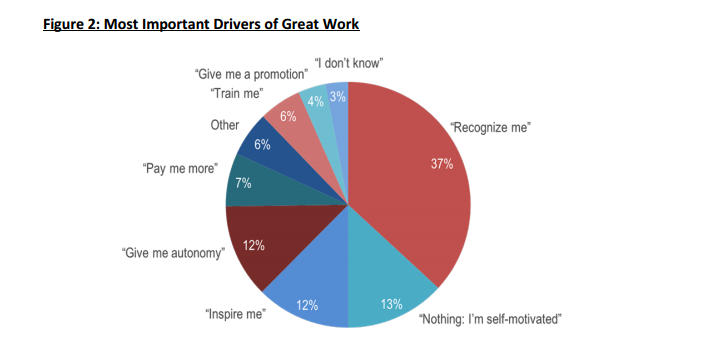Article written by Hannah Elise Jones (Great Place to Work US)
The Five Elements Meaningful Programs Have in Common
All companies face the question of how to recognize and reward their employees. It has always been a cornerstone of effective management, but today, as the competition for talent becomes stronger, the ways in which organizations value their employees becomes increasingly important. But creating a recognition program is not something organizations do once and accept as perfect. Great organizations are constantly reiterating and reevaluating the way they reward employees, changing to meet the needs of their people and match the expectations of the market. As companies grow this becomes even more of a challenge and leaders are forced to rethink the way they add value to the employee recognition experience.
The Truth About Recognition
We all want and need recognition. From a very early age we crave it from parents, teachers, and friends. Our whole lives are modeled around constant social feedback and acknowledgement. So strong is our desire for positive affirmation, particularly during developmental periods, that even a neutral reaction can be perceived as a negative one. When we move to the workplace, this orientation is no different. It is key that employers focus on how they can make authentic and meaningful recognition part of their management philosophy in order to retain top talent and encourage high performance.
A whitepaper commissioned by Fortune 100 Best Company to Work For and Great Place to Work-Certified company, O.C. Tanner, investigates the root cause of great employee performance and how managers can tailor their workplaces to promote it. The paper gathers its conclusions from an open-ended survey where respondents were asked the question, "What is the most important thing that your manager or company currently does that would cause you to produce great work?" Respondents answered in their own words, providing a variety of responses, but some clear patterns did emerge. Overall, 37% of respondents stated that more personal recognition would encourage them to produce better work more often. While other themes like autonomy and inspiration did surface, recognition was the most dominant, illustrating the importance of affirmation, feedback and reward for motivating employees to do their best work.
The complete results are illustrated in the chart below:

How to Create a Meaningful Recognition Culture in Your Organization
Despite the fact that this study and others prove the importance of meaningful recognition, it is still something that many companies struggle to define and produce. At Great Place to Work we see many of our clients, even those with strong cultures, face challenges when it comes to team and individual recognition on a large, organizational scale. While there is no universal program that will work at every company, there are a few key elements of authentic recognition that all organizations and managers can use to create more meaningful recognition experiences.
- Be Specific, Be Relevant – Recognition is more meaningful when it is tied to a specific accomplishment or business objective. Being specific helps employees relate the recognition to their behavior, encouraging continued strong performance.
- Be Timely – Recognition that is given months after the fact loses its meaning by degree. The longer it takes for managers to recognize employees, the more likely it is that the actions will be perceived as less authentic.
- Recognition Comes in Many Shapes and Sizes – There is a great deal of research that indicates people are motivated by more than money, but monetary gifts can go a long way when recognizing employees. Beyond a bonus or a raise, consider personal gifts, tickets to events, or other purchases that show employees their reward is personalized to them.
- Little Things Go a Long Way - While it is very important to recognize significant accomplishments and milestones, everyday thanks yous can be just as, and sometimes more motivating, to employees. Writing handwritten notes, or using the intranet to promote the good behaviors of individuals can help instill a regular culture of recognition. These thank yous and shout outs do not have to come from managers alone; they can also come from peers, which some employees may find more motivating.
- Connect to the Bigger Picture – Use recognition practices to help employees see that they are valued in the organization and an integral part of the success of their team, their department and the company overall. This is particularly key when organizations grow or change as it helps employees build a sense of security in their value to the company, motivating them to continue high performing work.
Learn Recognition from the Best
Organizations on the Fortune 100 Best Companies to Work For list excel in employee recognition. Here are some examples of how these winning organizations recognize and reward their employees in meaningful ways.
Make it Easy for Managers to Celebrate Employees: Global hotel chain Hilton provides managers an annual Recognition Calendar that features 365 no- and low-cost, easy-to-implement ideas to thank employees. The calendar includes reminders and tips for enterprise-wide, brand, and department recognition programs, appreciation best practices, important dates like International Housekeeping Week, and recognition quotes to share with employees. The calendar also allows users to add employee service anniversaries and local events. Users can download a print-friendly PDF or import an Outlook-friendly file into their personal calendars.
Make Recognition a Red-Aert Event: When clients of professional services firm Crowe respond to a satisfaction survey with the names of individuals who have gone above and beyond during projects, the survey generates a "Recognize Alert." Crowe takes Recognize Alerts one step further with a “Pay It Forward” program. Individuals who were recognized can "pay it forward" to other colleagues who played important roles in serving clients but weren’t mentioned in the survey response. Crowe shares the names of both Recognize Alert and Pay It Forward recipients in Crowe Newswire On Demand so others can learn from their examples and the individuals feel appreciated.
Meaningful Gestures of Gratitude: Health care system Texas Health Resources recognizes employees' milestone years of service at five-year increments. At every milestone, honorees receive a beautiful customized celebratory yearbook. When the honored individuals receive their digital yearbook, each one opens with a personalized congratulatory message of appreciation from the CEO, and includes messages of thanks and appreciation from their manager and coworkers, and photos of the employee at work with their team, having fun, and contributing to the mission.
Recognition is absolutely essential in a great workplace, and it doesn’t need to be complicated or expensive. Ask your employees what type of recognition is most meaningful to them. You may be surprised to find how much simple, genuine expressions of thankfulness inspire them to do their best.

